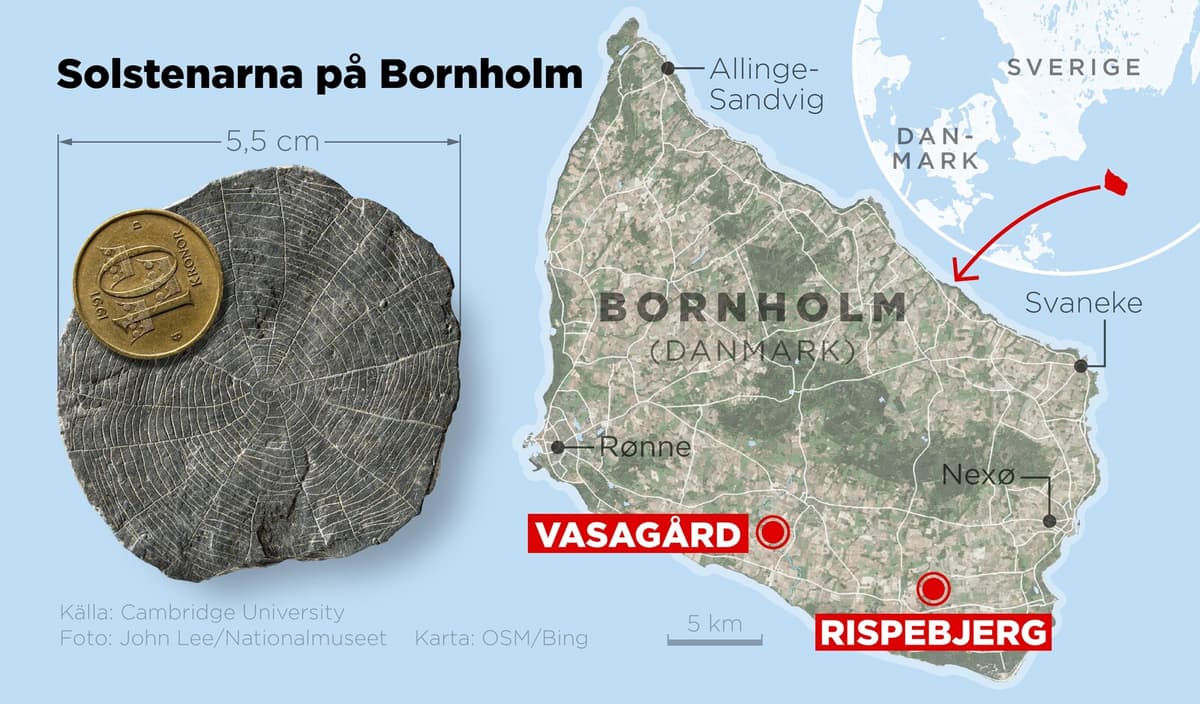On southern Bornholm, the fertile hills roll down towards the Baltic Sea, an agricultural idyll since ancient times.
But in 1995, they began to find processed stones in the ground, "sun stones" that turned out to originate from a shaking crisis several thousand years ago.
The archaeologists at the excavation site Rispebjerg were able to determine that the stones were 4,900 years old. But they found no explanation for why they were manufactured.
In 2013, Rune Iversen and his colleagues from the University of Copenhagen and the Danish National Museum began new excavations at Vasagård, ten kilometers from Rispebjerg.
It was only now that we found large quantities of sun stones. They are very fragmented, but we have over 600 pieces, says Iversen, who is a lecturer in archaeology and one of the authors of an article about the finds in the journal Antiquity.
Extreme Deviation
They show one of Europe's earliest confirmed sun cults. The flat stones were apparently manufactured on a fairly large scale, but during a very short period.
They are very limited in time. So they are probably the result of a unique event, says Iversen over the phone to TT.
No written sources from that time exist. So the researchers began to look for other data. The people of Bornholm at the time were farmers, and very dependent on the weather and climate – that the sun shone over the fields, that the crops grew as they should.
Studies of tree rings confirm some form of extreme weather deviation.
You could see that there had been poor growth years for the trees, with frost temperatures during the spring and summer seasons.
The next crucial piece of the puzzle turned out to be at a completely different scientific institution in the Danish capital.
We found ice core researchers at the Niels Bohr Institute here in Copenhagen, who had demonstrated a volcanic eruption around 2,900 years before Christ, says Rune Iversen.
They could see it in ice cores from Greenland as well as from Antarctica.
"Black Sun"
The location of this volcano is unknown, but since the ash has been found both at the South Pole and near the North Pole, the eruption may have darkened the sky worldwide.
The Danish researchers compare with a similar event almost 3,000 years later, when Roman writers describe a "black sun" for several years after the death of Emperor Caesar. The cause was the massive eruption of the Okmok volcano in Alaska.
The sources describe that there were two years of crop failure, cold summers, disease outbreaks.
That it was ash that was behind it was unknown to both the Romans and the Bornholm farmers 2,850 years earlier.
It must have been a frightening phenomenon, that the sun almost disappears or is completely dark. That the seeds do not germinate in the ground and it is cold, notes Iversen, and explains that the temperatures may have dropped by 7-10 degrees.
And they did not know why. Or how long it would last – is it forever, is the world on its way to destruction?
Sowing Sun Motifs
Just on Bornholm, there is a lot of shale, flat stones on or near the surface. The researchers conclude that the islanders carved lavish plants and mini-suns on the stones, which were then offered or "planted" in the ground.
They sowed sun motifs, to – perhaps symbolically – get the sun to grow, to get it to come back.
A desperate act, if you will. You have to do something.
An alternative interpretation is that the sun stones were made a little later, as thanks for the sun returning after a few catastrophic seasons. However, it is likely that the unique sun cult on Bornholm was then considered to have worked, when the volcanic ash settled.
Yes, it "succeeded", laughs Iversen.
An island in the Baltic Sea that now belongs to Denmark.
People are believed to have settled on Bornholm from the early Stone Age. They hunted the now-extinct aurochs, but also began to farm.
The crisis 2,900 years before our time apparently hit very hard. In addition to the tree rings showing crop failure, DNA testing of human skeletons reveals that "the plague was very widespread and deadly" at this time, according to the University of Copenhagen.
The catastrophe was followed by a new start for the entire society. Long-standing traditions were abandoned, and the so-called Funnel Beaker culture – named after characteristic ceramics – gave way to an era called the Battle-Axe culture, which would last for half a millennium.
Some of the sun stones will be exhibited at the National Museum in Copenhagen.






